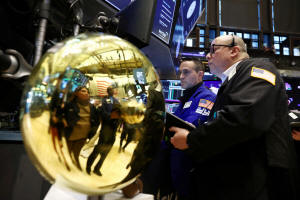Analysis-Investors seek uncorrelated assets on worries volatility will
return
 Send a link to a friend
Send a link to a friend
 [February 10, 2023] By
Laura Matthews [February 10, 2023] By
Laura Matthews
(Reuters) - Concerns that last year's wild swings in stocks and bonds
will resurface in 2023 are boosting the appeal of investments less
dependent on upside in either asset class, such as managed futures and
private markets.
Soaring interest rates sparked a rare lockstep tumble in equity and
fixed income last year, upending traditional diversification strategies
such as the 60/40 portfolio and igniting demand for investments that aim
to deliver returns not correlated to broader markets.
Both stocks and bonds have bounced so far this year. Yet some market
participants are convinced the Federal Reserve’s fight against inflation
will keep markets volatile and are allocating funds to so-called
alternative investments.
"Given everything we're seeing right now, the current macro environment
isn't the most favorable for equities," said Chung Ma, managing director
for the Portfolio Solutions Group at Virginia Retirement System, which
oversees around $100 billion.

VRS has increased its allocation to commodity trading advisors, or CTAs
- funds that seek to exploit price trends in a range of asset classes -
by between 20% to 25% over the past year. The fund expects to have
between $300 million to $500 million in the strategies by year-end.
Ideally, such investments will generate a "stream of returns that can
give you a smoother ride," Ma said.
CTAs and managed futures funds are among several types of alternative
investments that boomed amid last year's volatility, growing their
assets to $362 billion from $348 billion at the start of 2022, according
to the BarclayHedge Fund Flows Indicator.
Many of the strategies notched impressive gains. The SG Trend Index,
which tracks the returns of the 10 largest managed futures funds, rose
27.35% last year compared to a 19.4% fall for the S&P 500.
Those types of returns are not typical, however, and the performance of
CTAs has been more muted in less volatile markets. The SG Trend index
logged an average annual gain of 6.52% since 2000, compared to a 7.94%
total return for the S&P 500.
"It's not a panacea, it doesn't work all the time," said Maria Vassalou,
co-CIO of multi-asset solutions at Goldman Sachs Asset Management. "But
in times like this past year ... trend following tends to do well."
Bearish investors say markets are likely to remain choppy. Last week's
blowout U.S. employment report lifted expectations for how high the Fed
will need to raise rates to cool the economy, a message reinforced by
Fed Chairman Jerome Powell on Tuesday.
The S&P 500 is up 6.73% year-to-date and yields on benchmark 10-year
Treasuries, which move inversely to prices, are down 16 basis points.
[to top of second column] |

Traders work on the trading floor at the
New York Stock Exchange (NYSE) in New York City, U.S., January 27,
2023. REUTERS/Andrew Kelly/File Photo

"While the exact trends may shift, a volatile macro environment
likely persists this year," said Jordan Brooks, principal and
co-head of the Macro Strategies Group at AQR, which oversees around
$100 billion. The firm's Managed Futures Strategy HV Fund returned
50% in 2022.
Investors are also looking to private credit markets, where they
hope to generate steady income, sidestep volatility and hedge
against inflation by lending to private companies.
Private markets raised $216.9 billion in 2022, putting assets at
$1.4 trillion as at June 2022, from $311 billion in 2010, according
to data provider Preqin.
Candice Bangsund, vice-president and portfolio manager for global
asset allocation at Fiera Capital, a Montreal-based asset manager
with assets of approximately $118 billion, has increased allocations
to private credit strategies, as well as real estate and
infrastructure.
Bangsund expects the investments to yield between 5% to 8% annually
in "what we anticipate will be a recessionary and potentially more
volatile macroeconomic environment," she said.
A 2023 study from State Street found that 68% of investors plan to
increase their allocation to private markets in the next two to
three years.
Investors in private credit markets take on their share of risk.
Alternative investment firm Blackstone saw a spate of redemptions
from its $69 billion unlisted real estate investment trust last year
on concerns about its slowness to adjust valuations amid rising
interest rates.

Vassalou, of Goldman Sachs, believes correlations between asset
classes will likely revert to normal in 2023, making it easier for
investors to diversify in stocks and bonds.
Others say volatility may not subside so quickly. Erik Knutzen,
multi-asset chief investment officer at Neuberger Berman, believes
inflation will remain comparatively high, weighing on stocks and
bonds if the Fed keeps monetary policy tight. He has seen more
demand for uncorrelated investments from clients in recent months.
"The new environment for a number of years to come is likely to have
higher structural inflation," he said. "In that environment, stocks
and bonds are likely to be more correlated."
(Reporting by Laura Matthews; Editing by Ira Iosebashvili and Daniel
Wallis)
[© 2023 Thomson Reuters. All rights
reserved.]
This material may not be published,
broadcast, rewritten or redistributed.
Thompson Reuters is solely responsible for this content. |